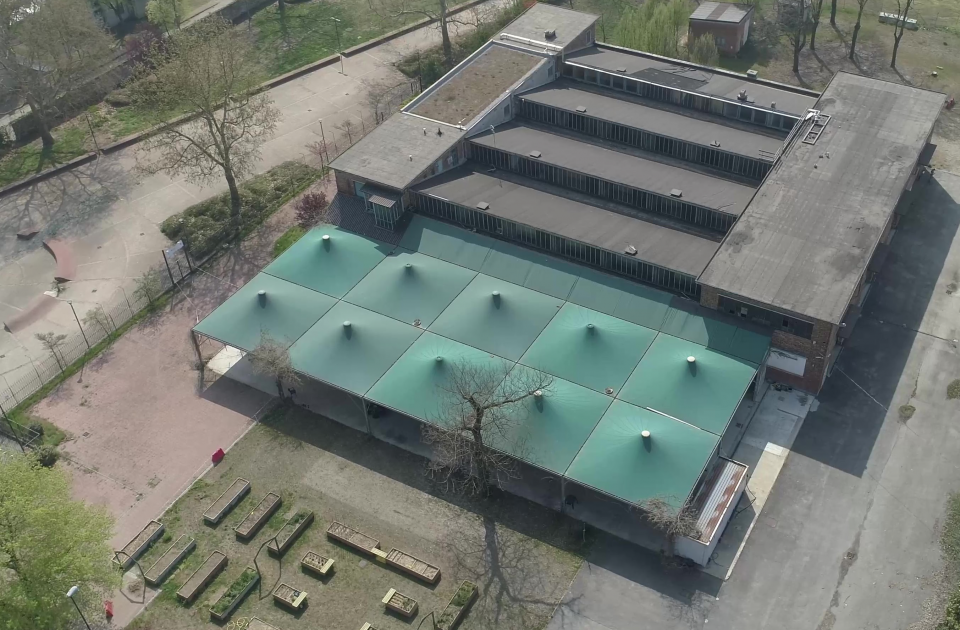
Mirafiori Sud district is famous because here FIAT was born and all the area was design and developed to host its workers. Today the area suffer from post-industrial heritage such as high seniority of population, great unemployment, loss of relational fabric.
Implementing an extensive green roof on a currently abandoned public building. The building was originally a factory and is owned by the City of Turin. It housed the National Agricultural Mechanical Centre since 1951, and was then managed by a social cooperative. Being abandoned a few years now it is waiting for future uses. Public access to the roof is not possible.
The green roof, located in a section of the roof a public building located in via Onorato Vigliani 102, previously known as VOV102, now named WOW, covers an area of 140 sqm and is conceived as a “natural lawn”. Sowing a mixture of seeds from stable meadows of northern Italy allows calibrating the use in plains and mountain areas up to 1000 - 1500 m of altitude.
The NbS addresses multiple dimensions:
- Experimenting with technical and administrative issues relevant to green roofing technical implementation.
- Promoting the re-use of the abandoned building, representing a first step in proposing innovative uses of green infrastructure by implementing the green roof in a small part of the roof
- Long-term goal is to extend it further to other parts of the roof.
Planning and preparatory activities (administrative and technical procedures)
The initial project started with the idea of creating a roof top garden to be managed by a citizens‘ association. After evaluating and excluding other buildings, the feasibility study led to the roof of the building located in via Onorato Vigliani 102 (WOW). Structural loadbearing studies limited the construction of the roof garden to a specific portion of the building’s flat roof.
Consequently, planning focused on an area of 140 sqm to create an extensive, low maintenance green roof with a flowering lawn, serving as a pasture for bees. Alternative types of extensive green roof vegetation were also considered including:
- sedum (requires less maintenance but is less attractive for pollinating insects);
- lippia nodiflora (low maintenance, quite attractive for pollinating insects);
- meadow florin plant (higher maintenance but higher biodiversity and attraction of pollinating insects).
Given the willingness of the beekeepers to mow the flowering meadow, it was decided to opt for the flowering meadow.
The roof has been provided with a lifeline. The roof is accessed through an aerial platform, restricting access only to specialized personnel.
Irrigation is secured by harvesting rainwater.
Co-design and engagement activities
Fondazione Mirafiori, Coldiretti and an informal network of beekeepers were engaged in the co-implementation process of the Pollinator friendly Garden. The Covid-19 pandemic hampered the engagement process, but activities restarted after restrictions ended by organising the maintenance and accompanying activities with citizens.
During the co-design process, the Heritage Management Department of the City of Turin decided to provide its offices for managing the construction site.
Botanists from the University of Turin (UNITO)consulted in selecting suitable vegetable species to plant on the green roof to create a mellifluous garden attracting pollinators.
The decision of the City Council to develop the site and collaborating with Fondazione Mirafiori in the co-design and management process has a major achievement. In addition, the process has led to opening a tender for the future renovation and reuse of the building.
The intervention has stimulated new perspectives of the future reuse of the WOW building.
To date, private sector players have expressed interest in renovating and using the building in accordance with the new “green vision” of the City of Turin.
- Developing climate change adaptation; improving risk management and resilience
- Increase Biodiversity
- Changing image of the urban environment
- Increase communities’ sense of ownership
- Increase social interaction
- Provision of health benefits
EU Horizon 2020 project:
Total implementation budget and proGIreg funds: 53.500 €
- Arboretum
